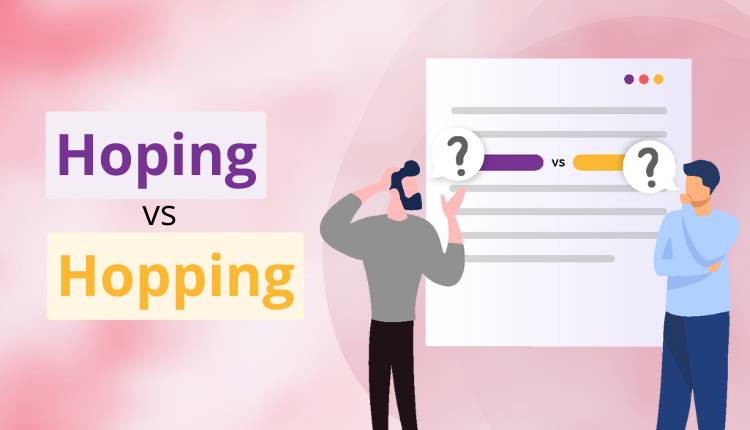Language is tricky, particularly when words that sound alike cause confusion. Consider “hoping” and “hopping,” for example. Both words might look interchangeable at first glance, but they have different meanings that can alter the meaning of your sentences entirely. When you’re drafting an email or writing a story, it’s important to know the difference to ensure clarity and effectiveness. Let’s dive into what each word means, explore their differences, and provide some handy examples to sharpen your understanding.
What Does “Hoping” Mean?
Hoping is a verb that signifies desire or expectation of something to occur. It is an indication of optimism, usually linked with personal wishes or aspirations. If you hope, then you look forward to a good thing happening, be it getting a job, reaching a target, or just looking forward to good weather.
This term represents an emotional condition where uncertainty is accompanied by the idea that things can go well. For example, when a person says they are hoping for good performance in an exam, it indicates their readiness and confidence in them.
What Does “Hopping” Mean?
Hopping is a rapid, bouncy motion normally taken by humans or animals. It is the activity of leaping gently from point to point, normally employing two feet or switching between them. Visualize a kangaroo gently hopping across the landscape.
In colloquial use, “hopping” may also imply going to many places over a short period of time. You could say you’re hopping from party to party on a Saturday evening. This colloquialism conveys a lively energy and a sense of spontaneity in movement and activity.
Hoping vs Hopping: Key Differences
Hoping and hopping may have a similar sound, but they have greatly different meanings. “Hoping” means to wish something or have a desire for something to happen. It’s all about expectation and optimism, usually accompanied by emotions and aspirations.
Alternatively, “hopping” refers to a physical movement—namely, jumping or hopping lightly on one foot or two feet. This is a more active word with movement, as opposed to hoping’s more reflective essence. Being aware of these distinctions can make your communication more precise when communicating about desires versus actions.
Sentence Examples for “Hoping”
“I’m hoping to get a promotion at work this year. My co-workers are great, and I think my hard work will finally be rewarded.”
“She’s hoping for a sunny day on her wedding day in a month’s time. The venue is outside, and it is beautiful, but the weather is always changeable in spring.”
Sentence Examples for “Hopping”
The term “hopping” is usually used to describe a fast, bouncing motion. For instance, you can say, “The rabbit was hopping in the garden.” This descriptive phrase shows the playful and lively personality of the animal.
In another instance, note how we employ it in activities: “She likes hopping from one café to another on weekends.” Here, it points out enjoyment and spontaneity in her visits. Both sentences reflect different uses of “hopping,” pointing out its versatility in describing movement or leisurely transitions.
Tips to Remember the Difference
To differentiate between “hoping” and “hopping,” pay attention to their meanings. Keep in mind that “hoping” is about wanting or expecting, whereas “hopping” is the act of jumping. Relating them to images can assist; picture a person longing for something when you hear hoping.
Another helpful tip is to construct sentences using both words in various contexts. This exercise solidifies your knowledge of each term’s usage in communication. Practicing the tips repeatedly will make it simpler to recall which word belongs where without second-guessing.
Hoping vs Hopping in Various Contexts (Formal vs Informal, British vs American English)
The terms “hoping” and “hopping” can shift in tone depending on the context. In formal settings, “hoping” often conveys anticipation or expectation, such as when making polite requests like, “I am hoping for your support.” Meanwhile, “hopping” tends to be more playful or casual; it’s what you’d say when someone is energetically jumping around at a party.
When British and American English are compared, both of them use the words in the same way. But regional colloquialism could affect the way they’re said. For example, Brits can easily utter that they’re “hopping mad,” whereas Americans would maybe just say they hope without any hopping.
How Trinka Grammar Checker Can Help
Trinka Grammar Checker is a great tool for whoever wishes to improve his or her writing. It assists you in avoiding common mistakes and perfecting your sentence structure, making your work clear. If you are a student or a professional, it can greatly improve the quality of your work.
When it comes to making a distinction between words such as “hoping” and “hopping,” Trinka offers in-real-time recommendations that help distinguish usage. This makes selection of the appropriate word depending on context easier, improving your writing ability while taking less time on revisions.
Conclusion
Knowing the difference between “hoping” and “hopping” is essential for good communication. These two verbs, although sounding similar, have entirely different meanings. By understanding their meanings and uses, you can improve your writing and prevent common errors.
Whether you’re expressing a want or reporting a physical action, being aware of when to use each of these words will advance your language skill. Use tools such as Trinka Grammar Checker to promote clarity and correctness in writing. Practicing and applying the subtleties of these words, you’ll be a better communicator.

